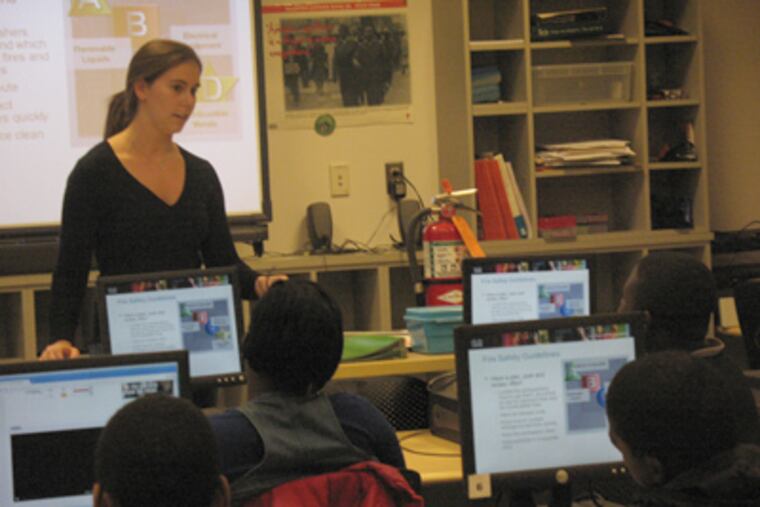Philly program gives students a different take on computers
After finishing his day at Dobbins High School, sophomore Tyreek Elam installs a Nintendo video game on a Dell PC while waiting for a different class to start.

After finishing his day at Dobbins High School, sophomore Tyreek Elam installs a Nintendo video game on a Dell PC while waiting for a different class to start.
He has always been proficient using computer software, and from 4 to 6 p.m. Mondays, Wednesdays, and Fridays, Elam and 12 other high school students from across Philadelphia learn about computers from a technical perspective.
"I have a passion for computers," said Elam, 15, on why he spends an additional six hours a week in another classroom setting.
The program, Digital Connectors, now in its second year, helps prepare high school students for a career in information technology. It is held in the Honickman Learning Center on Judson Street in North Philadelphia and in 11 other cities, including Washington, Miami, Denver, and Chicago.
Digital Connectors is sponsored nationally by Comcast and in Philadelphia by nonprofits Project HOME and People's Emergency Center. The 12-month program starts in September.
Philadelphia's Digital Connectors program is taught by Christina Harrison, who also teaches art and technology at Ewing (N.J.) High School. She interviews all prospective students; there were 25 this year, and she selected 10 boys and three girls.
"I want to see that they're here for the reasons we want them here for," said Harrison, 27, "that they have an interest in technology, computers, and giving back to their community."
Interactive teaching has helped maintain the students' interest. Lately, they have been learning the anatomy of the computer by taking the center's old, broken-down computers apart and putting them back together.
"It's amazing," said Elam, who said he had not had much experience working with computer hardware before Digital Connectors.
Toward the end of the program, the students must take what they have learned back to their neighborhoods to satisfy Digital Connector's required 56 hours of community service.
Harrison's first Digital Connectors class formed its own version of a "geek squad" in the summer for a community-service project. She said her current students would also likely offer free computer repairs as their community service.
"There were times when there were lines of neighbors coming in to get their computers repaired," said Sister Mary Scullion, executive director, president, and founder of Project HOME. "It was a great sight."
The ultimate goal of Digital Connectors, Harrison said, is for the students "to be more well-rounded individuals."
Students leave the course with Cisco certification, a prerequisite for a career in information technology.
"I've had the opportunity to spend time with the kids at the beginning, middle, and end of their Digital Connectors courses, and it's remarkable to see their passion and engagement," David L. Cohen, Comcast's executive vice president, said before heading to Atlanta for another Digital Connectors launch.
The aim is to expand the program to 50 cities under Comcast's approximately $5 million contribution.
Elam said that he aspired to a career in the culinary arts, but that the Digital Connectors course would bolster his resume.
"I'll always be able to fall back on computer engineering," he said.